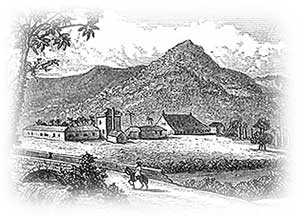To Citizen Sophie Boisson, Cahors
Toulouse, 21 February 1800
They gave me your letter when I arrived, my dear Sophie. It took a really long time to reach me because we never stay in the same place. At last I have it, after waiting with much impatience, and read it with all the eagerness I feel about anything from you. Thank you for all the details, and congratulations on having one of your sisters with you and knowing that the other is well. I most sincerely hope you are soon reunited.
You want, my dear friend, to know our situation? It could not
be sadder; we are like people whom
the country has totally robbed; which is to say that our position is
not wonderful! …. We are hoping however that
things will change.  For a
long time we have been
authorised, by a
decree from the Directoire, to reclaim all
our possessions in Saint-Domingue2. We
have sent this decree there, plus countless letters of attorney. We
do not know if all
this has been received, but have learned indirectly that our property
has not been sold and is very well
tended. That is a great satisfaction while we wait for better. It is
ten years since we received any revenue, from
Isle-de-France3 or
from America. When we came to France we brought considerable
funds and for the first five years
lived very comfortably. The sixth and the seventh were not so good, the
eighth and the ninth
went from bad to worse and, by the tenth, we were obliged to move to
Tilh. It is, as you know, a most
undesirable place, where we were bereft of all society. Madame
Crouzilhac (with whom, by the way, we very occasionally travel) has
sold her property in order to buy one near Toulouse; it is said to be
very agreeable.
You see from all I tell you, my dear Sophie, how little I have to amuse
myself in Tilh: I accept
my lot, however, and eventually find myself reasonable about it all,
but I shall confide to you truly that it is not
always like that.
For a
long time we have been
authorised, by a
decree from the Directoire, to reclaim all
our possessions in Saint-Domingue2. We
have sent this decree there, plus countless letters of attorney. We
do not know if all
this has been received, but have learned indirectly that our property
has not been sold and is very well
tended. That is a great satisfaction while we wait for better. It is
ten years since we received any revenue, from
Isle-de-France3 or
from America. When we came to France we brought considerable
funds and for the first five years
lived very comfortably. The sixth and the seventh were not so good, the
eighth and the ninth
went from bad to worse and, by the tenth, we were obliged to move to
Tilh. It is, as you know, a most
undesirable place, where we were bereft of all society. Madame
Crouzilhac (with whom, by the way, we very occasionally travel) has
sold her property in order to buy one near Toulouse; it is said to be
very agreeable.
You see from all I tell you, my dear Sophie, how little I have to amuse
myself in Tilh: I accept
my lot, however, and eventually find myself reasonable about it all,
but I shall confide to you truly that it is not
always like that.
You make me feel doubly deprived, not having a town apartment, by telling me that your father came here last summer. With what pleasure we would have received my lovely Sophie’s father! ... It would have been a great delight for us, as you are well aware. Please give him my respects and receive those of Papa with whom I am in town (at one of our friends). My regards to your family, and a very fond hug to Fanny—does she remember me? My God, I seem still to see you both, I could paint you from memory! I often think of the pleasant times we spent in the beautiful Mosquère! It no longer exists. All the pretty walks are destroyed, the Jardin Aristocrate—as it is called in Lévignac—is not as it used to be, and I believe they are going to demolish the house. Even if they do not, I doubt the Dames Noires would wish to return when things are reconciled.
Now to the least interesting topic, as you call it. So your brother is very keen to know the name of this certain young man? That astonishes me, for gentlemen claim never to be inquisitive and I would even, on occasion, like to believe them. But, to content him, tell him, my dear friend, that he is called Charles. I do not know his surname at all, only that he told me, while heaving a great sigh, that he was the most intimate friend of your brother. And I imagined he was anticipating a closer relationship. I was wrong to think so, I see that clearly, so I promise in future not to have any more suspicions.
Farewell, my dearest, I love you with all my heart.


